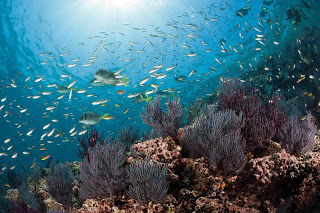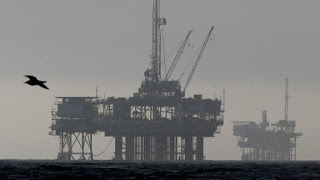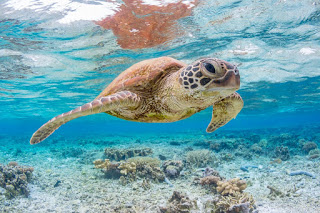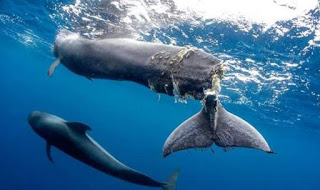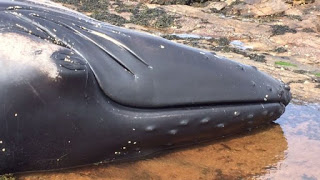CITES postponed due to recent Sri Lanka terrorist attacks, International Monetary Fund and Earth Day, U.S presidential message on Earth Day 2019, New jellyfish discovery, Ocean species disappearing faster than land species, Ocean microbe discovery, Petrochemical industry reports U.S coastal states unite to ban offshore drilling and much more…
1. The Secretary-General’s statement on the postponement of CoP18
The Secretariat regrets to announce that the 18th meeting of the Conference of the Parties (CoP18), originally scheduled to take place from 23 May to 3 June in Colombo, Sri Lanka, as well as the associated 71st and 72nd meetings of the Standing Committee, are being postponed. This decision has been taken out of respect for the victims of the recent attacks and the recognition by the Standing Committee, the Secretariat and the United Nations Department of Safety and Security of the time needed for the Government of Sri Lanka to address the current situation in the country.
International Monetary Fund, Managing Director Christine Lagarde had a one-on-one conversation with Sir David Attenborough, during the April IMF-World Bank Spring Meetings on the environment and life on earth. The conversation explored more specifically the interplay and spillovers between the natural world and the economic and financial world. Attenborough recommended treating the natural world in a manner similar to basic economics, guarding nature’s capital, so profits from it could continue into the future.
 President Trump’s Earth Day video, “Earth Day is a celebration of the abundant beauty and life-sustaining bounty of our natural environment. On this day, we reaffirm our responsibility to protect God’s wondrous creation for future generations. From the Appalachian Mountains to the golden shores of California, America is blessed with some of the most beautiful scenery on Earth. As Americans, we all share immense pride in these God-given treasures and a tremendous appreciation for our abundance of natural resources.”
President Trump’s Earth Day video, “Earth Day is a celebration of the abundant beauty and life-sustaining bounty of our natural environment. On this day, we reaffirm our responsibility to protect God’s wondrous creation for future generations. From the Appalachian Mountains to the golden shores of California, America is blessed with some of the most beautiful scenery on Earth. As Americans, we all share immense pride in these God-given treasures and a tremendous appreciation for our abundance of natural resources.”
———————————————-
4. New jellyfish species discovered in the Indian Ocean
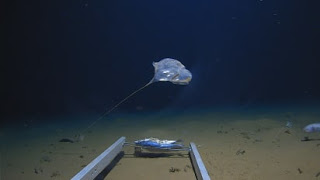 In the deepest chasms of the Indian Ocean, a mysterious new creature’s been spotted, potentially for the first time. Diver Victor Vescovo was on a pioneering trip to the bottom of the Java Trench — believed to be the deepest point in the Indian Ocean — as part of the Five Deeps Expedition, that’s being filmed for Discovery Channel.In the trench’s murky depths, Vescovo and his team spotted what they think is a previously unseen species of jellyfish. They captured footage of the creature, which the team describes as an “extraordinary gelatinous animal” which “does not resemble anything seen before.”
In the deepest chasms of the Indian Ocean, a mysterious new creature’s been spotted, potentially for the first time. Diver Victor Vescovo was on a pioneering trip to the bottom of the Java Trench — believed to be the deepest point in the Indian Ocean — as part of the Five Deeps Expedition, that’s being filmed for Discovery Channel.In the trench’s murky depths, Vescovo and his team spotted what they think is a previously unseen species of jellyfish. They captured footage of the creature, which the team describes as an “extraordinary gelatinous animal” which “does not resemble anything seen before.”
As the world’s average temperatures creep higher, marine animals are far more vulnerable to extinctions than their earthbound counterparts, according to a new analysis of more than 400 cold-blooded species. With fewer ways to seek refuge from warming, ocean-dwelling species are disappearing from their habitats at twice the rate of those on land, notes the research published Wednesday in the journal Nature. The study, led by researchers from New Jersey’s Rutgers University, is the first to compare the impacts of higher temperatures in the ocean and on land for a range of cold-blooded wildlife, from fish and mollusks to lizards and dragonflies.
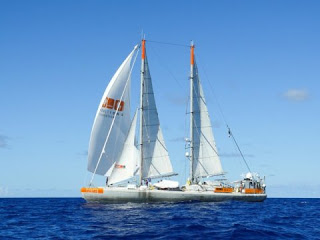 Advanced molecular techniques have revealed the diversity of a little-understood group of ocean microbes called protists, according to a new publication. The project analyzed samples collected by the global Tara Oceans expedition, documenting genomes that will help researchers identify protists throughout the ocean. “So many ocean protists cannot be grown in the lab, so we must find ways to interrogate them in their environment,” said Mike Sieracki, lead author of the study. “Every drop of seawater contains microbial ecosystems we know very little about, and it is urgently important to understand this fundamental ecosystem of our ocean planet, Earth, and how it reacts to change.”
Advanced molecular techniques have revealed the diversity of a little-understood group of ocean microbes called protists, according to a new publication. The project analyzed samples collected by the global Tara Oceans expedition, documenting genomes that will help researchers identify protists throughout the ocean. “So many ocean protists cannot be grown in the lab, so we must find ways to interrogate them in their environment,” said Mike Sieracki, lead author of the study. “Every drop of seawater contains microbial ecosystems we know very little about, and it is urgently important to understand this fundamental ecosystem of our ocean planet, Earth, and how it reacts to change.”———————————————-
7. Petrochemical industry report: “US coastal states work to block offshore drilling”
South Carolina, Georgia and Florida lawmakers are renewing a push to stop President Donald Trump’s administration from allowing drilling off their shorelines. Political leaders in the states, which are led by Republican governors and Republican-majority legislatures, are leaning on their political clout with the White House in hopes of being removed from a federal leasing plan that in a draft envisions oil and gas leasing on more than 90pc of federal waters.
8. Endangered green sea turtle populations are recovering in Pacific coral reefs
The population of endangered green sea turtles that inhabit the coral reefs of the Pacific Ocean is growing thanks to decades-long conservation efforts, according to scientists. However, the study lays bare the threat still faced by the green turtle’s neighbor the hawksbill, which is the most at-risk turtle species and listed as critically endangered by the International Union for Conservation of Nature (IUCN).The team of researchers studied 53 coral islands, atolls and reefs in the Central, West and South Pacific Ocean in an area spanning 7,3000 linear km every April between 2002 and 2015. Divers counted turtles inhabiting four U.S. Pacific Island areas: American Samoa, the Hawaiian Archipelago, the Mariana Archipelago and the Pacific Remote Island Area complex.
9. Native populations say “no” to gas and oil drilling.
 The oil-and-gas industry has worn out its welcome in Canadian marine conservation areas, and Canada’s environmentalists are overjoyed. Fisheries Minister Jonathan Wilkinson unveiled new standards for marine protected areas in Canada on Thursday, fully prohibiting oil-and-gas activity, as well as mining, waste-dumping and bottom-trawling. The change implements recommendations made to the government last year by an advisory panel and brings Canada up to international standards set by the International Union for Conservation of Nature.
The oil-and-gas industry has worn out its welcome in Canadian marine conservation areas, and Canada’s environmentalists are overjoyed. Fisheries Minister Jonathan Wilkinson unveiled new standards for marine protected areas in Canada on Thursday, fully prohibiting oil-and-gas activity, as well as mining, waste-dumping and bottom-trawling. The change implements recommendations made to the government last year by an advisory panel and brings Canada up to international standards set by the International Union for Conservation of Nature.10. Hundreds of dolphins and whales killed by boats in Canary Islands every year
Heartbreaking photographs and film footage have illustrated the plight of whales and dolphins in the seas around the Canary islands, where experts believe hundreds are being killed every year as a result of collisions with boats, warning the situation amounts to “an environmental catastrophe”. A dozen cetaceans killed as a result of accidents have been recovered in the Canary Islands since the start of the year, with the scientific community stressing the seriousness of the situation.
 A plastic bags environmental initiative from Gebr Heinemann, launched in 2017, has been so successful that the company expects to be able to donate €1 million annually to marine conservation efforts in the future. At Heinemann’s annual results conference on Tuesday (16 April) in its home town of Hamburg, Co-owner and Advisory Board Member Gunnar Heinemann was clear about the global travel retailer’s commitment to its CSR (corporate social responsibility) strategy. “In the future, we want to take an even closer look at the economic, social, and ecological impact of our business since a company like ours – which has a presence in many destinations around the globe – needs to be mindful of its actions and their consequences,” he said.
A plastic bags environmental initiative from Gebr Heinemann, launched in 2017, has been so successful that the company expects to be able to donate €1 million annually to marine conservation efforts in the future. At Heinemann’s annual results conference on Tuesday (16 April) in its home town of Hamburg, Co-owner and Advisory Board Member Gunnar Heinemann was clear about the global travel retailer’s commitment to its CSR (corporate social responsibility) strategy. “In the future, we want to take an even closer look at the economic, social, and ecological impact of our business since a company like ours – which has a presence in many destinations around the globe – needs to be mindful of its actions and their consequences,” he said.
12. Australian conservationists welcome “Labor” parties promise to save Great Barrier Reef
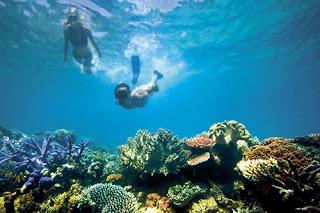
A Labor promise to reclaim a $444 million Great Barrier Reef grant and return it to public agencies has been welcomed by Australian Marine Conservation Society (AMCS), Australia’s peak marine conservation body. However, AMCS also highlights the need to limit global warming to 1.5 degrees Celsius. The AMCS said the announcement from Labor Leader Bill Shorten to terminate the grant to the Great Barrier Reef Foundation was welcome because it would put public money back into the hands of publicly-funded agencies with science-backed expertise. AMCS also strongly supports Labor’s promise to restore the Great Barrier Reef Marine Park Authority (GBRMPA) as a “strong, independent champion of the Reef”.
13. Necropsy reveals dead whale was tangled in rope for months before demise
A humpback whale was entangled in rope for “weeks, if not months” before it drowned off the coast of East Lothian, a post-mortem examination has found. The young male, which was about nine metres long (30ft), was found at John Muir Country Park, near Tyningham. Experts said the marine mammal had become very weak and had the most parasites they had ever seen. The whale was towed out to sea and moved to another beach for the five-hour necropsy on Wednesday.
———————————————––


